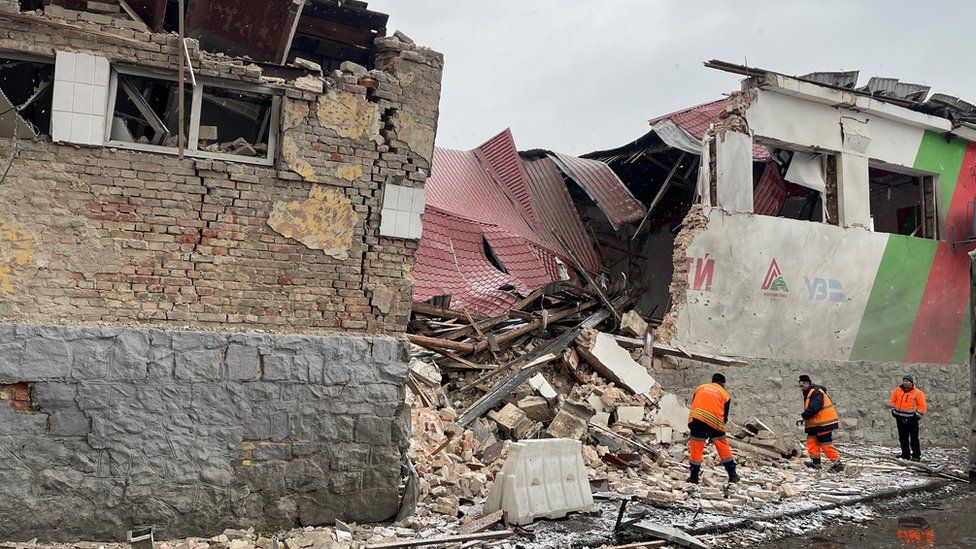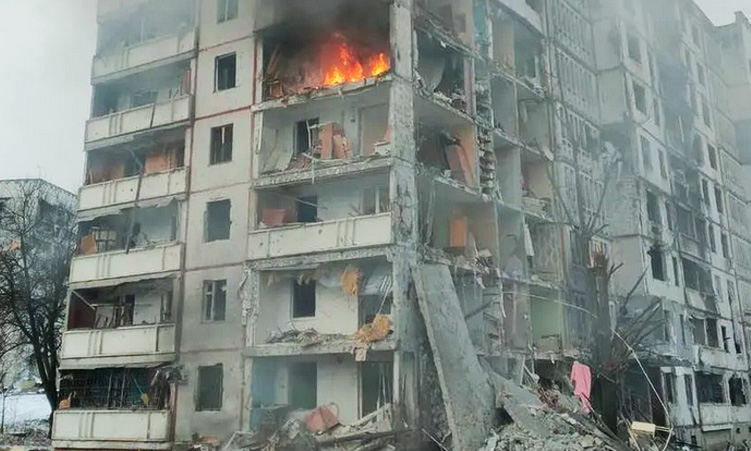Six people have been killed and dozens of people wounded in Russian missile attacks targeting the Ukrainian capital Kyiv and second biggest city Kharkiv, according to officials.
Residential buildings were hit early on Tuesday in the north-eastern city of Kharkiv, leaving five people killed and another 42 injured.
They included two women of 40 and 56.
The city mayor said part of a block of flats was destroyed and rescue workers searched the rubble for survivors.
The sky over Kharkiv turned burnt orange with fire after the strikes, which used multiple kinds of Russian missiles. The city is close to the border – it’s difficult to intercept the missiles in the air.
Kharkiv resident Natalia told the BBC she doesn’t remember things being this “loud” since the start of the war: “My house shook. It was all very loud. There were explosions, then another ten seconds – and another bang.”
“Many people are without power and heating. Other than fear and hatred, at this moment I feel nothing,” she said.
At least one person was killed in the industrial city of Pavlohrad in the Dnipropetrovsk region.
In Kyiv, the air raid went on for more than two and a half hours, the longest since 2 January. Several other people were hurt when a block of flats caught fire and another was damaged.
A spokesman said a young woman was pulled from the rubble. Initially rescuers thought she had died, but she is now in hospital in intensive care. Most of the casualties were in Kyiv’s central Solomianskyi and western Sviatoshynsky districts.
In Sviatoshinsky district, several residential buildings were damaged. Hours after the attacks, emergency services told the BBC they were still on the scene and looking for explosives as it was suspected there may be part of a missile that did not detonate.
Three other regions of Kyiv were also damaged by falling debris after air defences intercepted the Russian missiles during the attack. The office of mayor Vitaliy Klitschko says 20 people have been injured and 13 are in hospital, including children.
Elsewhere in the city, when the attack was over, city residents emerged from their bomb shelters and homes to check the damage.
In areas lucky enough not to be hit this time, people went about their morning as usual. Shops opened up, and roads and streets were busy.
At a hospital the BBC visited, staff kept working through the air raid, even though they heard the explosions and felt the doors rattle.
But at the site of the missile attack on Tuesday afternoon, emergency workers were picking through the debris where large fragments fell on a block of flats.
All the flats at one end of the building were blackened by fire, some of the balconies badly smashed. There were piles of furniture and belongings in the snow in the street.

Behind the police cordon, local residents, including curious children, were also examining the damage.
Tetyana, who had come from a few streets away, said her family had spent the early morning air raid in the bathroom of their flat – hoping they would be safer, further from any windows.
“At the start of the war we thought we would get used to this, but you never do,” she told the BBC. “It’s scary every single time.” A few months ago, their own building was damaged by shrapnel when a drone was shot down over the city.
Ukraine’s air force said it had destroyed 21 of 41 missiles launched by Russia overnight.
Missile strikes on Ukraine’s cities are now a deadly reality of this war and attacks have intensified in recent weeks.
Reflecting Ukrainian concerns that its demands for weapons are not being met by Western allies, the head of the presidential administration, Andriy Yermak, published a video of the damage in Kharkiv and said: “Kharkiv. We are not just a ‘fortress’. We need weapons!”
Ukrainian forces have in the past week targeted Russian energy infrastructure, including unprecedented attacks on an oil terminal in its second city St Petersburg.
Energy company Novatek has had to halt some of its operations after a fire at its Ust-Luga Baltic Sea export complex.
Stay informed with The Namibian – your source for credible journalism. Get in-depth reporting and opinions for
only N$85 a month. Invest in journalism, invest in democracy –
Subscribe Now!







